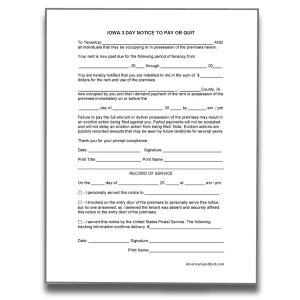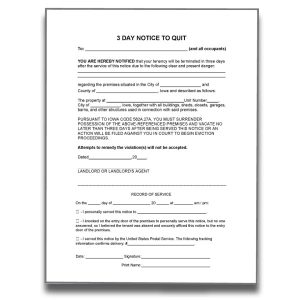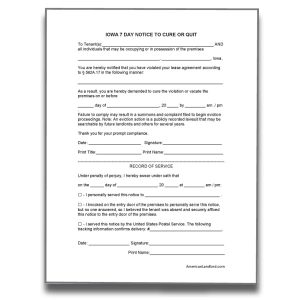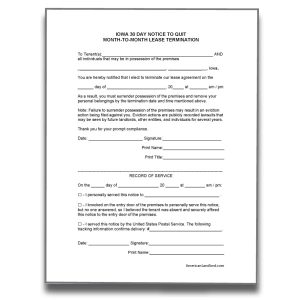Iowa Eviction Process
The information contained within is intended for residential landlords in Indiana and does not encompass commercial or agricultural property.
1. Prepare a notice to quit. Before a formal court filing can occur, a landlord needs to prepare the proper notice to terminate the tenancy:
- Iowa 3 Day Notice to Pay or Quit (For nonpayment of rent)
- Iowa 3 Day Notice to Quit (For a clear and present danger)
- Iowa 7 Day Notice to Cure or Quit (For lease violations other than nonpayment)
- Iowa 30 Day Notice to Quit (For month-to-month agreements)
2. Eviction proceedings are filed online. If the tenant doesn’t comply with the demands as set forth in the notice, the landlord may begin eviction proceedings by filing online:
- Set up an account on Iowa Efile.
- Complete this Notice and Petition for Forcible Entry and Detainer.
4. Tenant is served. The landlord must have copies of the court documents served on the tenant by a process server.
5. Eviction Order. The court will schedule a hearing date within 8 days of filing.
6. Sheriff’s Assistance. If the tenant is still living on the premises by the time the court rules in the landlord’s favor, the landlord has the right to ask the sheriff to escort the tenant off the property with an authorization from the the court.
Notice to Quit
A 3 Day Notice to Pay or Quit demands a tenant to bring the rent current or vacate.
-
Original price was: $12.95.$9.95Current price is: $9.95.
A 3 Day Notice to Quit is to demand a tenant vacate the premises in 3 days due to their actions which created an unsafe or unhealthy situation.
-
Original price was: $12.95.$9.95Current price is: $9.95.
A 7 Day Notice to Quit is to demand a tenant correct violations of their tenancy within 7 days or move out.
-
Original price was: $12.95.$9.95Current price is: $9.95.
A 30 Day Notice to Quit is not initially for a violation, but for deciding not to renew a monthly rental agreement. It only becomes a part of the eviction process when a tenant refuses to move.
-
Original price was: $12.95.$9.95Current price is: $9.95.



